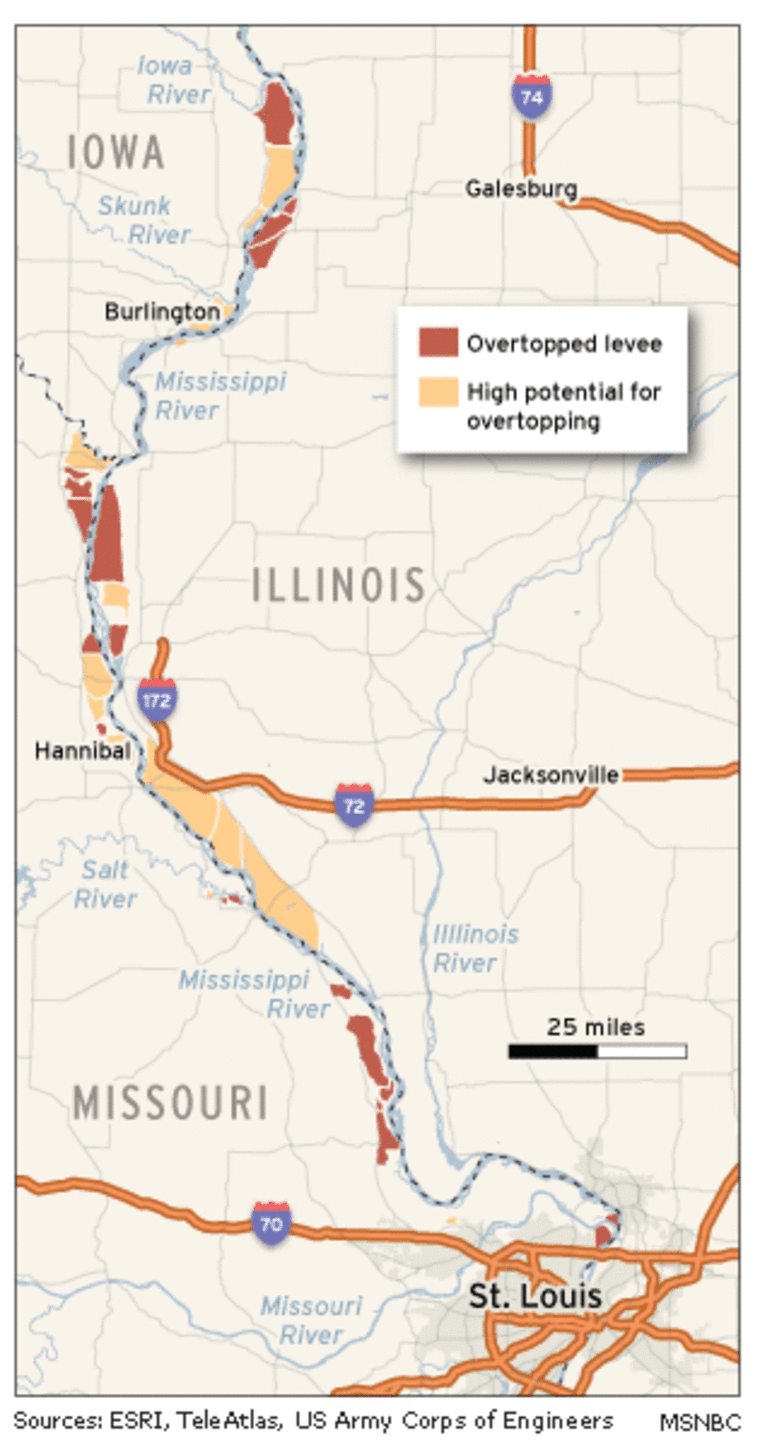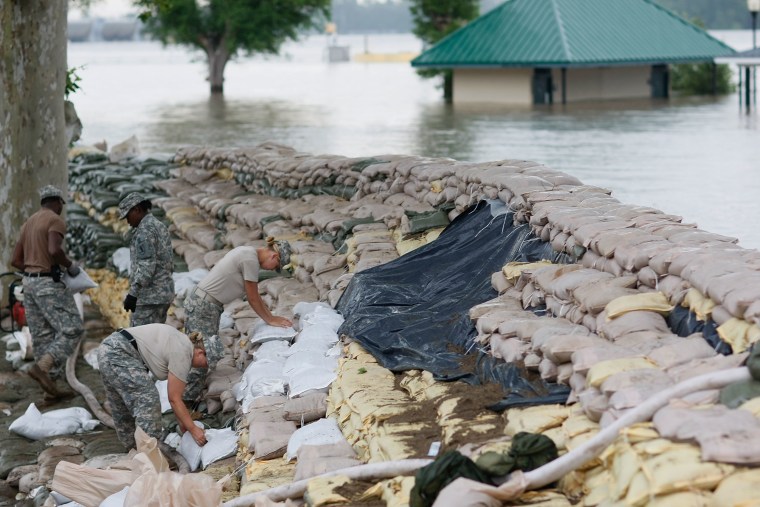Towns along the Mississippi River got good news and bad news Friday from the National Weather Service: Crest predictions were dramatically lowered for some areas, but the region was told it could expect storms through the weekend.
The crest revisions came after several levee breaks in Illinois, including one on Wednesday near Meyer that potentially could inundate 17,000 acres of farmland with water that otherwise would have been flowing south.
The new prediction shows St. Louis cresting at 37.3 feet on Friday, well short of the 49.58-foot record in 1993.
But National Weather Service meteorologist Jim Kramper said river towns aren't safe yet.
"There will still be a lot of places with major flooding," Kramper said. "Even at the levels we're expecting now, a lot of places are threatened."
The weather might not help, with forecasters predicting showers and scattered thunderstorms in Missouri and Iowa both Friday and Saturday before the precipitation moves out Sunday.
Second 100-year flood in 15 years
In Foley, Mo., Keith Aubuchon on Thursday found himself packing his belongings and evacuating his home to escape a "100-year" flood of the Mississippi River for the second time in 15 years.
He returned and remodeled his house after the flood of 1993. This time, he doesn't know if it will be worth coming back.
"This is my second flood. I don't think there will be a third," Aubuchon said as he drove a pickup truck loaded with a washing machine and other belongings out of his subdivision. Floodwaters rapidly filled the roads, yards and gullies behind him just hours after a levee breached north of Foley. Authorities estimate much of the small town will be flooded by the weekend.
Three Mississippi River levees broke Thursday in Lincoln County, sending a creeping wave of water toward Foley and causing more concern in nearby Winfield.

The river was overflowing 90 percent of the levees in eastern Lincoln County, and at least four more breaches were expected to aggravate the flooding overnight, said Lincoln County Emergency Management spokesman Andy Binder.
The Mississippi River will likely remain above flood stage for weeks. But compared to the region's last major flood in 1993, a lack of high water on the Illinois and Missouri rivers, two major channels feeding the Mississippi, was encouraging officials.
Still, the flooding and violent storms have been blamed for 24 deaths since late May across the Midwest, have generated untold damage in the billions of dollars, and are expected to aggravate rising food prices since they ravaged prime areas of the Midwest Cornbelt.
Insurance companies that sell crop coverage to farmers, including market leader Ace Ltd., were expected to face big claims of as much as $3 billion in Iowa alone, a Lehman Brothers analyst said.
Claims from homeowners may not be large because few have flood insurance, analysts said. Only 17 percent of Americans buy the coverage, the Insurance Information Institute said.
In Cedar Rapids, Iowa, nearly 4,000 homes in Cedar Rapids were damaged or ruined.
"Now we begin the process of assessing debris removal and short-term and long-term housing needs," said Bret Vorhees of Iowa Emergency Management.
The relief for some river towns came at a cost for communities where levees failed. The first levee breached in Lincoln County on Wednesday near Winfield, about 50 miles north of St. Louis, followed Thursday by the series of breaks that spilled water into sparsely populated areas, Binder said.
The southward flows were expected to put increasing pressure on a series of inland levees protecting the towns of Winfield and Elsberry. To help raise the levees an additional 2 feet, dozens of volunteers filled tens of thousands of sandbags in Winfield. The bags were piled onto pallets and shipped to the levees where roughly 150 National Guard members stacked them on top of the existing walls.
"It's about the most rewarding thing I've done in a long time," said David Hays, a computer programmer from Chesterfield, Mo., who took time off work to help fill sandbags. "I was filling sandbags until I couldn't move my arms. Then I held bags until my shoulders hurt. Then I became a supervisor."
Bush and Katrina
In Iowa, where residents are mopping up after the deluge in Des Moines and Iowa City, President Bush surveyed the flood's aftermath on Thursday and assured residents and rescuers alike that he is listening to their concerns.
"Obviously, to the extent we can help immediately, we will help," said Bush, still mindful of criticism that the government reacted slowly to Hurricane Katrina three years ago.
"You'll come back better," the president said. "Sometimes it's hard to see it."
Bush was in Europe when tornadoes hit and heavy rains sent rivers surging over their banks, killing at least 24 people, the majority in Iowa. He made a point to try to show his concern while overseas and traveled to Iowa just two days after returning.
At the briefing in Cedar Rapids, Bush, his shirt sleeves rolled up, told local officials that he came "just to listen to what you've got on your mind."
Noting that several hundred federal emergency workers were fanning across Iowa, he added: "That ought to help the people in the smaller communities know that somebody is there to listen to them."
The sluggish federal response when Katrina devastated the Gulf Coast in 2005 was judged woefully inadequate and brought heavy criticism of Bush and FEMA. It also brought sensitivity on the part of federal officials each time disaster has struck since to show that things were working better.
FEMA Administrator R. David Paulison accompanied Bush to Iowa on Air Force One and praised the "great coordination" between federal, state and local leaders.
Paulison said one thing FEMA was doing differently was working better with other partners — the Army Corps of Engineers and even Wal-Mart — to distribute supplies. The agency also was placing stocks of sandbags and other supplies in states or towns where flooding hadn't hit yet or material had not been requested, just to be ready, he said.
